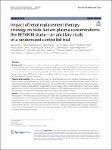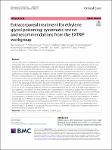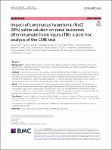Search
Author
- Damien, Roux (1)
- David, Hajage (1)
- Marc, Ghannoum (1)
- Nicolas, Benichou (1)
- next >
Subject
Date issued
- 2023 (3)
Has File(s)
- true (3)
Search Results
Sepsis prognosis correlates with antibiotic adequacy at the early phase. This adequacy is dependent on antibacterial spectrum, bacterial resistance profile and antibiotic dosage. Optimal efficacy of beta-lactams mandates concentrations above the minimal inhibitory concentration (MIC) of the targeted bacteria for the longest time possible over the day. Septic acute kidney injury (AKI) is the most common AKI syndrome in ICU and often mandates renal replacement therapy (RRT) initiation. Both severe AKI and RRT may increase outside target antibiotic concentrations and ultimately alter patient’s prognosis. |
Ethylene glycol (EG) is metabolized into glycolate and oxalate and may cause metabolic acidemia, neurotoxicity, acute kidney injury (AKI), and death. Historically, treatment of EG toxicity included supportive care, correction of acid–base disturbances and antidotes (ethanol or fomepizole), and extracorporeal treatments (ECTRs), such as hemodialysis. With the wider availability of fomepizole, the indications for ECTRs in EG poisoning are debated. We conducted systematic reviews of the literature following published EXTRIP methods to determine the utility of ECTRs in the management of EG toxicity. |
To evaluate if the increase in chloride intake during a continuous infusion of 20% hypertonic saline solution (HSS) is associated with an increase in the incidence of acute kidney injury (AKI) compared to standard of care in traumatic brain injury patients. |



